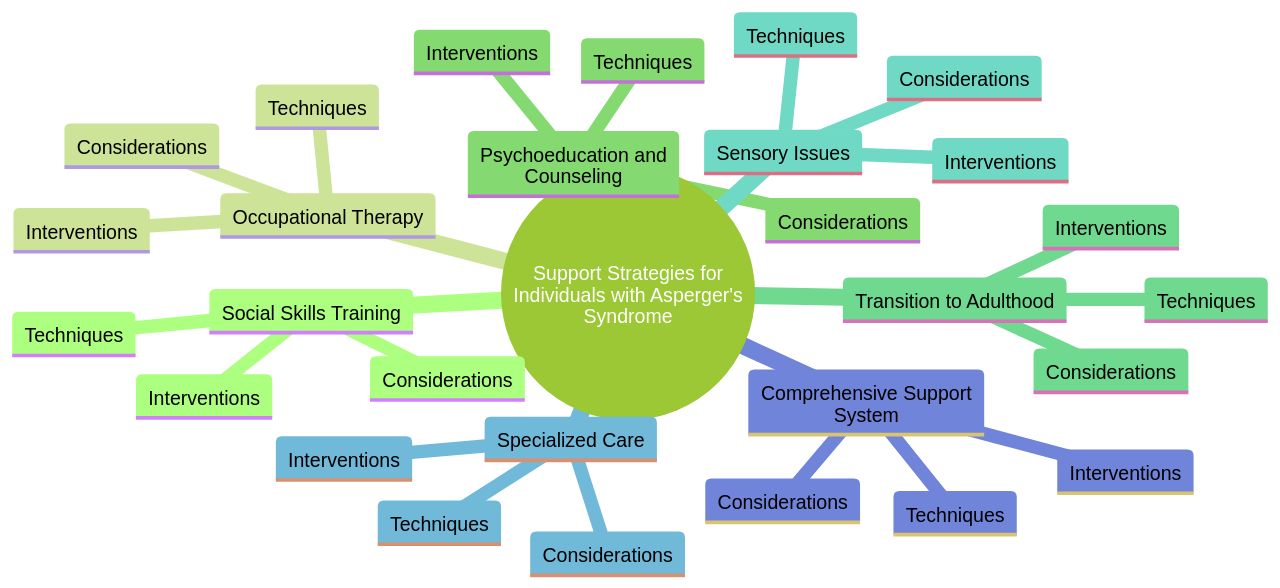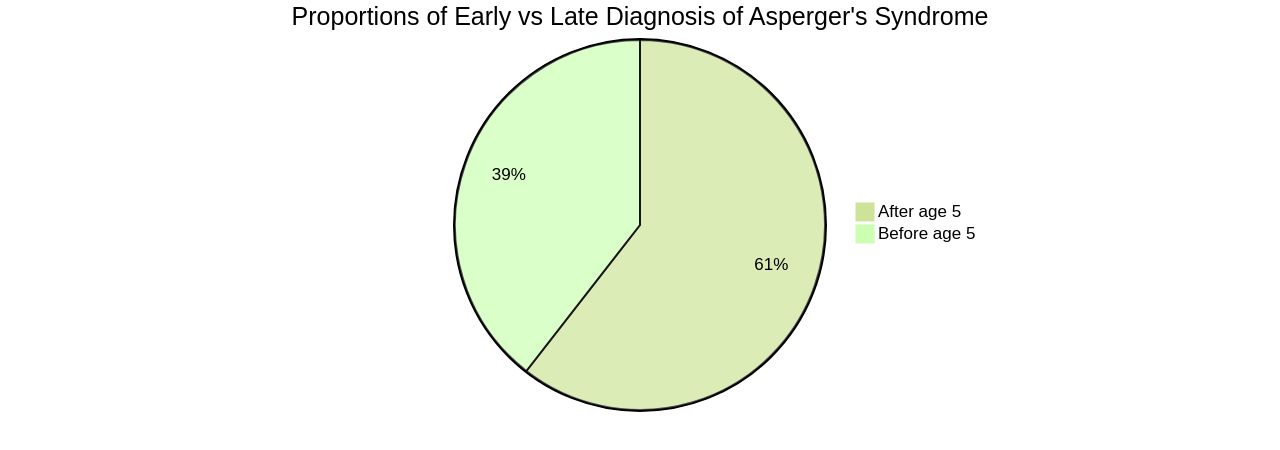Introduction
Asperger's Syndrome, a profile on the autism spectrum, presents with a unique constellation of characteristics that impact social communication and behavior. While individuals with this profile often have average or above-average intelligence, they may encounter challenges in social interactions and may engage in repetitive patterns of behavior.
In this article, we will explore the key characteristics of Asperger's Syndrome, the impact on social interactions and relationships, support strategies for individuals with Asperger's Syndrome, and the importance of early diagnosis and intervention. By understanding these aspects, we can provide guidance and resources to help Parent Advocates navigate the challenges and ensure the well-being of their children.
What is Asperger's Syndrome?
Asperger's Syndrome, a profile on the autism spectrum, presents with a unique constellation of characteristics that impact social communication and behavior. While individuals with this profile often have average or above-average intelligence, they may encounter challenges in social interactions and may engage in repetitive patterns of behavior.
Notably, the nuances of Asperger's can be complex, as evidenced by the life of Donald Triplett, known as 'Case 1', the first person diagnosed with autism. Triplett, who recently passed at 89, demonstrated a mix of independence and savant skills, such as rapid mental calculations, throughout his life.
His contributions to the understanding of autism are documented in various media, including a book and a PBS documentary. In another context, a study in Broadmoor Special Hospital revealed a prevalence of Asperger's Syndrome higher than that in the general population, indicating that it may often go unrecognized, especially in forensic settings.
This understanding is further complicated by the decision of journals like Pediatric Research to cease the use of 'Asperger Syndrome' in their publications, to acknowledge the contributions of others in the field and the problematic historical associations of the term. Research underscores the importance of recognizing the nuances of autism, including the potential for co-occurring conditions such as anxiety and ADHD, which can influence the presentation of traits. Adults with Asperger's may experience a range of symptoms that evolve over time and through major life transitions. The challenges of social communication and the tendency for restricted, repetitive behaviors remain central features, but the manifestation can vary significantly among individuals. As awareness grows, so does the understanding that each person with Asperger's navigates the world in a distinctly personal way, often requiring tailored support and resources.
Key Characteristics of Asperger's Syndrome
Asperger's Syndrome, a profile within the autism spectrum, is characterized by a myriad of social and behavioral features. Individuals often experience pronounced challenges in deciphering social nuances, which can manifest as misinterpretation of gestures, facial expressions, and other nonverbal forms of communication.
Additionally, these individuals might exhibit a deep commitment to specific interests, embracing routines that provide a sense of order and predictability. Repetitive behaviors, which can serve as a coping mechanism for stress or anxiety, are also commonly observed.
For instance, a study from the UC Davis MIND Institute highlighted that changes in core autism traits, such as repetitive behaviors, can have a profound impact on an individual's mental health, particularly during early childhood. Moreover, the study suggests that interventions aiming to eradicate these behaviors without offering alternative coping strategies may not be the most beneficial approach.
As our understanding of autism spectrum disorder continues to evolve, it is crucial to recognize the individuality of each person's experience. This understanding is echoed by the diverse voices within the autism community, some of whom identify with the term Asperger's, while others align with the broader definition of autism, specifically Level 1 ASD. These distinctions are more than just semantics; they reflect personal identity and the evolving diagnostic criteria, such as those outlined in the DSM-5-TR. As we navigate the complexities of autism spectrum disorder, it remains imperative to provide personalized, equitable support systems to individuals and their families, ensuring that their unique challenges are met with understanding and effective care.
Impact on Social Interactions and Relationships
Understanding the unique experiences of individuals with Asperger's Syndrome is essential, particularly when it comes to their social interactions. These individuals often encounter challenges with conventional social cues, such as making eye contact or interpreting subtle emotional expressions, which can impede the formation of deep and meaningful relationships.
The act of 'masking,' or concealing one's authentic self to blend into social settings, is a common strategy employed by those with Asperger's. This might involve adopting behaviors or interests that are deemed 'normal' to avoid negative judgments and to feel accepted by peers and society.
The constant pressure to conform can be exhausting and contribute to feelings of alienation. Dr. Tasha Oswald emphasizes the importance of empowering autistic individuals, helping them to thrive without feeling flawed for their differences.
This approach aligns with recent advancements in technology, such as emotion recognition tools developed by UWS academics, which can aid in understanding and navigating social interactions more effectively. Statistics reveal developmental disabilities, including autism spectrum disorder, are increasingly prevalent, affecting 8.56% of children aged 3-17 years in the U.S. during 2019-2021. Boys are diagnosed more frequently than girls, highlighting a gender disparity that warrants attention. The journey through adulthood for autistic individuals can be complicated by societal misconceptions and the need for specialized support that is often scarce. Clinicians equipped with knowledge and understanding can make a significant difference by including autistic adults in their practice, addressing conditions such as anxiety and depression, which are not unlike those experienced by the neurotypical population.
Support Strategies for Individuals with Asperger's Syndrome
Individuals with Asperger's Syndrome possess unique strengths, such as a keen attention to detail and a strong sense of justice. These can be fostered through tailored support strategies. Social skills training is essential, as it equips individuals with the nuances of interaction and effective communication.
Occupational therapy plays a critical role by enhancing sensory integration and imparting essential life skills. For adults navigating the complexities of adulthood with autism, psychoeducation and counseling are invaluable. They provide a deeper understanding of their condition and offer coping mechanisms for associated challenges like anxiety or depression.
The transition to adulthood can be particularly taxing, as individuals may lose access to youth support services and confront adult societal norms. This period requires a compassionate approach that acknowledges their specific needs. It's important for practitioners to ask about sensory issues to create a therapeutic environment that accommodates these needs, as suggested by research showing mindfulness-based therapies' success in reducing anxiety in autistic individuals.
Furthermore, when autistic adults seek specialized care, such as for grief or phobias, it is crucial they receive treatment from those with expertise in those areas, rather than being turned away due to their autism. As Dr. Valerie Gaus emphasizes, understanding how autism shapes one's worldview is key to providing effective support without exclusion. Ultimately, a comprehensive support system that fosters their inherent abilities and addresses their unique challenges can greatly enhance the well-being and life quality of individuals with Asperger's Syndrome.

Importance of Early Diagnosis and Intervention
The journey to understanding Asperger's Syndrome, a condition marked by unique social and communication challenges, as well as certain repetitive behaviors, begins with early detection. The current research underscores the critical nature of early diagnosis, as it can lead to interventions during a pivotal developmental phase.
Although behavioral signs can be observed in the first year of life, the average age of diagnosis tends to be around 3 years. This delay means many children miss out on early intervention which could significantly alter their developmental trajectory.
Studies emphasize the need for continuous monitoring to spot the early signs of Asperger's Syndrome, enhancing the likelihood of improved long-term independence, with only 10-20% of those diagnosed before the age of 5 achieving independent living as adults. Moreover, researchers like Naviaux are uncovering the complex interplay between genetic and environmental factors in autism, providing deeper insights into its developmental biology.
In light of these findings, healthcare providers are incorporating questions in routine checkups that may reveal early indicators of autism, enabling support and services to commence as soon as possible, sometimes as early as 12-14 months. This proactive approach is pivotal, as the development of autism is influenced by dynamic factors that can be addressed more effectively with early intervention. Despite the commonality of late diagnoses, recent studies suggest that the timing of the diagnosis may have less impact on quality of life than previously thought, indicating that it's never too late to benefit from understanding one's condition. However, the advantages of early intervention, including the opportunity for optimal outcomes, reinforce the importance of early detection and support for individuals with Asperger's Syndrome.

Conclusion
In conclusion, Asperger's Syndrome presents unique challenges in social communication and behavior. Understanding the impact on social interactions is crucial, empowering individuals to thrive without feeling flawed for their differences.
Support strategies should focus on strengths like attention to detail and justice, with interventions such as social skills training and counseling. Early diagnosis and intervention play a critical role in improving long-term outcomes.
By continuously monitoring and incorporating questions about autism in routine checkups, early indicators can be identified, enabling timely support and services. By understanding the characteristics of Asperger's Syndrome and implementing effective support strategies, Parent Advocates can navigate challenges with confidence. Prioritizing early diagnosis and intervention ensures optimal outcomes for their children's well-being and fosters their abilities for a fulfilling life journey.




